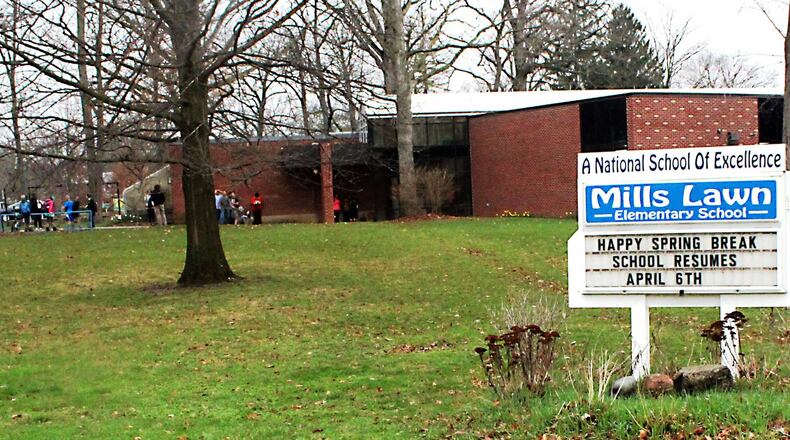The number of school levies has declined statewide in recent elections, according to the Ohio School Boards Association, and it’s fairly rare for the Dayton area to have only two districts seeking tax increases in an election.
Yellow Springs bond
The school district is asking voters to approve a combination property tax/income tax measure to pay for construction of a new $35.6 million K-12 campus school at the current high school site. The Ohio Facilities Construction Commission’s assessment estimated that fully renovating the schools rather than replacing them would cost over $31 million.
The proposed income tax is a permanent 0.5%, which would mean $250 a year for someone with $50,000 in annual taxable income. The property tax is estimated at 6.5 mills for 37 years to pay off the $23 million bond issue.
That property tax would cost the owner of a $100,000 home $227.50 per year, according to the Greene County Auditor’s Office. Funds from those two taxes would be used to pay off the bonds issued to initially fund the project.
In one levy explainer document, district officials wrongly understated the financial cost of the levy. That led some residents to say they don’t trust district leadership, and that the bond issue should be pulled from the ballot. Superintendent Terri Holden and Treasurer Tammy Emrick wrote a letter to community this week apologizing for the error.
“I know how it happened, but that becomes irrelevant at this point. … If we’re wrong, we’re going to say we’re wrong,” Holden said.
Holden said the state’s assessment shows Yellow Springs’ buildings are “in significant need of replacement and repair, more so than renovation.” She said the $9.25 million reimbursement the district would eventually receive from the OFCC is also a key reason she advocates for the project.
“We’ve never said it isn’t expensive. It is,” Holden said. “The question is, other options that people are proposing are also expensive. So where do we go from here? … We could end up chasing our tail forever, fixing things beyond their usable life.”
Bradford bond
Voters in the Bradford school district will decide on a 20-year, $1.7 million bond issue that Superintendent Joe Hurst said would pay one-third of the cost of significant athletic and bus upgrades at the school.
At 1.84 mills, the cost would be $64.40 a year on a $100,000 home if voters approve. The Miami County Auditor’s office confirmed that a previous Bradford bond is expiring at the same time, which would offset much of the new cost.
The project would include the new all-weather track and field facility and grass football field, with irrigation, lights and stadium grandstand, all behind the school. It would also include a new bus barn and connector road on the north side of the school, plus a multipurpose building near the new stadium with locker rooms, restrooms, concession stand, weight room and a basketball court.
Hurst said the total cost of the project Is $5.1 million, with one-third coming from the bond, one-third from the district’s general fund and one-third from grants and financing.
The district will hold a town hall meeting about the levy at 6:30 p.m. Oct. 26 in the school’s auditorium/cafeteria.
Piqua substitute
Piqua City Schools are asking voters to convert an existing emergency levy into a permanent 4.88-mill substitute levy. Substitute levies keep tax rates the same for existing properties, but allow the schools’ tax revenue to grow in future years if there is new construction.
The levy would continue to raise at least $2.1 million per year and continue to cost the owner of a $100,000 home $171 per year.
Renewal levies
Renewal levies keep residents’ tax rates the same, but extend those taxes’ into the future, either for another five years, or permanently.
** Milton-Union schools are asking voters to renew their 17-mill operating levy for the sixth time in 30 years and this time to make it permanent. It currently costs the owner of a $100,000 home $239.22 per year.
** Bethel school voters will cast votes on two separate renewal levies. The 2-mill facilities levy, which costs residents $35.10 per $100,000 of property value, would be renewed for five years. The district is asking voters to make permanent the 7-mill operating levy, which costs $184.69 per $100,000.
** Newton school voters will decide whether to renew their 0.75% income tax for another three years to pay for regular school expenses. For a person with $50,000 in taxable income, a 0.75% rate costs $375 per year.
** Twin Valley schools have two five-year renewal levies on the November ballot — a 2-mill property tax for facilities and a 0.75% income tax for day-to-day expenses.
** Tecumseh schools are asking voters to renew a 2.13-mill emergency levy that raises $712,000 annually for another five years.
Unmatched coverage
The Dayton Daily News is your only source for local election coverage. The newspaper has profiled more than 50 local races and tax issues and has candidate-submitted question and answers from hundreds of candidates in the Nov. 2 election. All of the content can be found at DaytonDailyNews.com/elections.
About the Author

